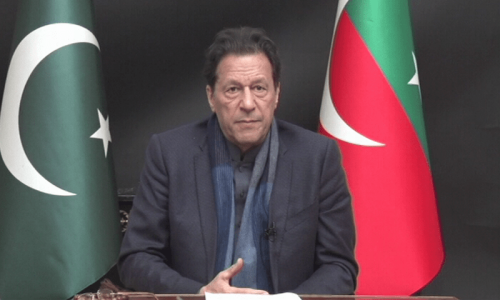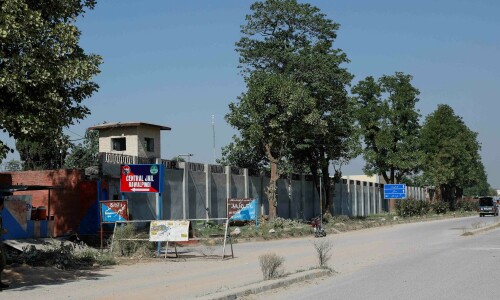• Court has not passed restraining order to stop proceedings, CJ Farooq observes
• Prosecutor says PTI chief creating hurdles in trial, alleges non-cooperation
• In first statement since incarceration, Imran vows not to leave Pakistan
• Proceedings meant to shield ex-army chief, US diplomat, former PM alleges
ISLAMABAD: As the Islamabad High Court (IHC) said the pendency of related petitions in the court has no bearing on the cipher trial of former prime minister Imran Khan, currently underway at a special court, the PTI chairman expressed his resolve to stick to his demand for ‘Haqeeqi Azadi’ and “free and fair elections”.
This is the first message issued by the incarcerated former premier, who was initially imprisoned following his conviction in the Toshakhana case and later in the cipher case after his sentence in the former was suspended by the high court. He was moved from the Attock jail to Adiala earlier this month.
During the hearing of a bail petition filed by Mr Khan, IHC Chief Justice Aamer Farooq made it clear that the pendency of a matter in the high court had no effect on trial in the subordinate court.
“Pendency of petition means nothing, trial to be governed by the trial court,” observed the chief justice. Justice Farooq pointed out that “there is no injunctive order passed by the IHC to stop [the] trial”.
The special prosecutor of the Federal Investigation Agency (FIA), Syed Zulfiqar Abbas Naqvi, claimed the former premier was creating hurdles in the trial proceedings as the defence counsel “refused to accept copies of challan”.
The FIA counsel said the defence refused to cooperate with the special court, saying that the petitions related to the trial were being adjudicated by the high court.
The FIA had on Sept 30 submitted a challan before the court, in which the agency reportedly declared PTI leaders as “principal accused” in a case registered under sections 5 and 9 of the Official Secrets Act for disclosure of the contents of classified diplomatic cable and misplacing the same.
Mr Khan’s counsel Barrister Salman Safdar argued that Section 5 of the secrets law was not applicable to the cipher case. He said the section could be invoked for sharing sensitive information with foreigners and this “main ingredient is missing” in the FIR. According to the counsel, the Official Secrets Act “is focused on armed forces and could be invoked for sharing information with enemy state”.
He argued that suspects under this law were tried by military courts in the past, saying this was the first time in history that a former prime minister and an ex-foreign minister were being tried under the secrets act.
He argued that the prosecution unnecessarily dragged them into the case by expanding the scope of the law, claiming that Mr Khan had the authority to retain cipher as the PM.
The FIR in the cipher case was registered after a delay of 17 months and it was marred with loopholes, he said, while referring to the proceedings of the Supreme Court in which the cipher was also discussed. The counsel said that Mr Khan did not share the entire cipher with the apex court.
He recalled that the National Security Committee (NSC) also deliberated upon this and recommended issuing a demarche. Barrister Safdar said on April 11, Shehbaz Sharif became the prime minister and he held a meeting on the cipher controversy on April 24. He pointed out that the cabinet was informed about the missing cipher about five months later and the inquiry was commenced after six months.
When Justice Farooq inquired about the minutes of the meetings on the cipher issue, the counsel replied that the National Security Committee issued a press release after every relevant meeting.
Justice Farooq remarked that the press release could not be treated at a par with the minutes of the meetings. Special prosecutor Naqvi informed the court that the minutes of meetings on cipher were never made public.
Barrister Safdar also claimed that the prosecution forced certain characters, including ex-PM aide Azam Khan, to testify against Imran Khan in the cipher case.
Special Prosecutor Raja Rizwan Abbasi argued that the former premier and Mr Qureshi were subject to the Official Secrets Act. He, however, added the suspects under this law had been tried by the military courts in the past.
However, if Mr Khan wants he could also face a court-martial under this law, he said in a response to arguments put forth by Mr Safdar.
Justice Farooq inquired whether the cipher was annexed with the challan; Mr Abbasi replied in negative. The court adjourned further hearing till October 16, the prosecution would continue arguments on the said date.
Meanwhile, the IHC CJ clubbed all the petitions related to the trial of Mr Khan in the cipher case. The court would take up these petitions next week.
‘Haqeeqi Azadi’
The statement of the PTI chairman was shared by the party’s media wing with journalists.
“Regardless of what prison they keep me in, whatever conditions they impose upon me, I will not back down even an inch from the quest of Haqeeqi Azadi, for the upholding of the rule of law and the Constitution of Pakistan, at the core of which is free and fair elections,” the statement quoted Mr Khan as saying. He also said he would not leave Pakistan to go anywhere.
In an allusion to the cipher case, Mr Khan alleged the case was designed to “protect former army chief general [Qamar Javed] Bajwa and [US official] Donald Lu”.
“I was elected the prime minister of the country. Treason was committed against me and my government by [retired] gen Bajwa, instead of investigating the foreign conspiracy in orchestrating a regime change, a case has been filed against me for informing the people of Pakistan, the real protectors of this country, about this treason,” he added.
“When I was incarcerated in Attock Jail, the first few days were particularly challenging. I was not provided a bed and had to sleep on the floor and had insects and mosquitoes all over me. But with time I have adjusted well to the prison conditions,” the former premier claimed.
“I appeal to the judiciary to provide justice and order the immediate release of our workers,” the statement added.
Published in Dawn, October 13th, 2023













































Dear visitor, the comments section is undergoing an overhaul and will return soon.